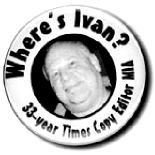SIX MONTHS AFTER The Seattle Times settled with the Newspaper Guild, the lawsuits, grievances, and bad blood keep on flowing. Monday last week was supposed to mark the end of the settlement transition, when the Times would call back the last employees hanging on the vine in the strike’s wake. Monday came and went with no callback for the Final Fourteen who had not already returned to work or taken early retirement or buyouts—and no surprise, at least for some of them. The reason is simple, says Times president Mason Sizemore: “We don’t have any work for them. We are 400 employees down.” Not so simple, says the Guild, which has filed yet another grievance against the Times, arguing that the return-to-work agreement obliges the Times to at least call these workers back before laying them off and that the Times violated the seniority list in some of those layoffs. The issue is not an abstract one for the Final Fourteen, says Guild administrative officer Liz Brown; they had nearly exhausted their unemployment benefits awaiting the recall and now will not be eligible again for benefits while they seek new jobs. Times president Mason Sizemore says only that “there are significant disagreements as to the meaning of the return-to-work agreement. If we cannot resolve that between us, the federal court will.”
Heading the list is Ivan Weiss, formerly the paper’s senior copy editor, the outspoken and endlessly quotable union activist, a shop steward for 20 years, who had become almost literally the poster child for strike solidarity and defiance. (His co-workers printed his picture on a button with the legend “Where’s Ivan? 33-year Times Copy Editor MIA.”) Neither Weiss nor his co-workers, some of whom wore black to mourn his absence, were surprised that he wasn’t called back. “They hate me because I stand up for myself and for my fellow employees,” he says, with a bluntness that indeed may not endear him to the Times corporate culture. “I always believed a professional journalist’s job was to question everything. These managers at The Seattle Times evidently want us to do that to everybody except them.”
Weiss has posted a “layoff manifesto” to Guild colleagues that’s also a sort of pre-Christmas card. One excerpt: “To keep me from returning to my job, this company will have to prevail in the Guild’s lawsuit, two arbitrations, and two NLRB hearings. . . . I doubt it will win a single one. We’ll see. Believe this: I will not give up this fight until I am back on the job. No other outcome is acceptable to me. . . . I’ll see you all around Christmas.” Assuming they’re still there, of course.
COLORS BARRIER. Another Times copy editor and union leader didn’t make it to the July deadline before getting sacked. Naomi Ishisaka, a member of the strike bargaining committee and Guild executive board, was called to come back to work in April. In the meantime she’d been editor of Colors Northwest, a magazine on “issues relevant to Northwest communities of color” that she’d worked on starting, unpaid, before the strike. The Times ordered her to drop Colors on the grounds that it violated a contract provision against working for competing publications. Ishisaka refused. The Times fired her. She’s challenged the firing and notes two unseemly points to it: The Times wasn’t paying her at the time, and it wouldn’t give her and others on the callback list letters affirming they had jobs to return to (which would have made collecting unemployment easier). And second, how can the state’s largest newspaper consider a bootstrap, mission-driven, 28-page free magazine “competition”? “We define ‘competition’ as anyone selling advertising in this market,” says Sizemore. “They’re calling on the same accounts we are.”
Colors did sell its back cover to the Bon.
THE SWING VOTE. “There are three people in Seattle who can make Paul Schell look good,” sneers the irrepressible Ivan Weiss. “Mark Sidran, Omari Tahir, and Frank Blethen.” Never mind Sidran and Blethen; Schell owes whoever swung that megaphone big time for making him look like a martyr and a survivor—the kind of mayor who’s not afraid to take a punch for his city. Ronald Reagan had to get shot to get the same sympathy boost. If Omari were smart, he’d plead to the deed and ask Schell for a job.








